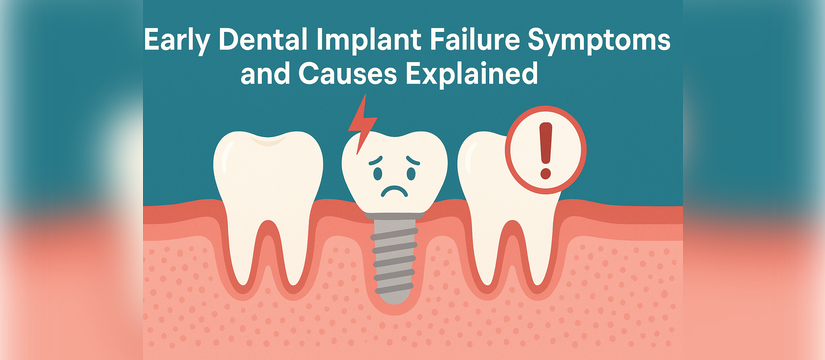
When someone makes the decision to restore their smile with dental implants, they’re not just choosing a cosmetic improvement. They’re making an investment in their overall dental health, comfort, and confidence. But it’s natural to feel concerned if something doesn’t feel quite right after surgery. That’s why we’re here to walk you through everything you need to know about early dental implant failure in a calm, simple, and reassuring way.
If you’re looking for Dental Implants in Rockville MD, you might be wondering what signs to watch for and how to avoid complications during the healing process. Getting answers early can make all the difference.
What Is Early Dental Implant Failure?
The first stage of early dental implant failure usually happens within the first three to six months after placement. This phase is critical because the implant is supposed to fuse with the jawbone during a process called osseointegration. If this process doesn’t go smoothly, the implant may not properly integrate and can become loose or painful.
These issues often create stress and disappointment for patients. But they don’t always mean the implant is lost. Catching signs early can give us the chance to adjust and correct problems before they become permanent.
If you’re looking for a Dentist Rockville MD, it’s helpful to work with someone who can evaluate your healing process regularly and give professional guidance when concerns arise.
Early Dental Implant Failure Symptoms
Some symptoms can appear mild at first. But over time, they can grow into more serious complications if left alone. Below are common early dental implant failure symptoms to keep in mind:
1. Ongoing Pain or Throbbing
- A small amount of soreness is normal after surgery.
- Pain that persists beyond the initial recovery period or worsens with time may signal an issue.
- Sharp pain when chewing or touching the area could point to implant instability.
2. Gum Swelling or Redness
- Slight inflammation is expected for a few days.
- Persistent or spreading swelling may indicate infection.
- Gums that feel warm or have pus-like discharge should be looked at immediately.
3. Loose Feeling Around the Implant
- Implants should feel as stable as natural teeth.
- If it wiggles or shifts even slightly, it may not be bonding correctly with the bone.
- A moving implant might be rejected or compromised by soft tissue problems.
4. Bleeding Around the Area
- Some light bleeding is expected during early healing.
- Ongoing or excessive bleeding may point to improper healing or infection.
5. Difficulty Chewing or Biting
- Discomfort during meals could mean the implant is under stress.
- Uneven bite pressure can affect integration and cause damage.
What Causes Early Dental Implant Failure?
No single factor is responsible. It’s often a combination of small issues that add up. Some causes include:
Poor Bone Density or Volume
- Implants need a stable bone structure to anchor securely.
- If bone loss has occurred from missing teeth or gum disease, grafting may be needed.
Infection or Peri-Implantitis
- Bacterial infections can develop post-surgery.
- Without early care, they damage surrounding tissue and weaken the implant.
Uncontrolled Medical Conditions
- Diabetes, autoimmune disorders, or clotting issues can delay healing.
- These conditions increase the risk of failure during osseointegration.
Smoking or Tobacco Use
- Tobacco reduces blood flow, impacting how the bone fuses to the implant.
- Even occasional smoking can slow recovery or introduce infection.
Incorrect Bite or Pressure
- Too much pressure from chewing or grinding can prevent the implant from staying firm.
- Early placement of crowns or bridges before the implant has settled may strain the site.
What Can Be Done About It?
The first step is to remain calm. Many of these symptoms and causes can be addressed early when caught in time. Here are some professional steps we might take:
- Monitoring and adjusting bite alignment to reduce pressure.
- Prescribing antibiotics if an infection is detected.
- Grafting additional bone to support implant stability.
- Replacing the implant if necessary after full healing.
- Temporary dietary adjustments are recommended to allow proper rest and healing.
Tips to Lower Your Risk
Healing is a partnership. The more care and attention you give your implant in the early weeks, the better the long-term results. Some helpful tips:
- Brush gently using a soft-bristled toothbrush.
- Avoid hot foods, alcohol, and tobacco products.
- Stick to soft, nutrient-rich meals during recovery.
- Keep all follow-up appointments to allow your dentist to check your progress.
- Report anything unusual, even if it seems minor.
When to Seek Help
If you’re feeling worried or confused about how your implant is healing, don’t wait. Pain that doesn’t fade, odd sensations, or bleeding should always be checked by your care provider.
We encourage patients to stay informed but not overwhelmed. Implants often feel better with a little time and the right adjustments. Being proactive and open with your provider gives you the best shot at a smooth recovery.
Final Thoughts
At Rockville Dental, we focus on more than just fixing smiles, we protect your peace of mind with gentle, informed care every step of the way. From the day of your consultation to full healing, we are committed to your comfort and clarity.
If you’re experiencing signs of implant discomfort or uncertainty, contact us at Rockville Dental. Let us take a look and help guide you to the next steps. Schedule your visit today and get the reassurance and care your smile deserves.
